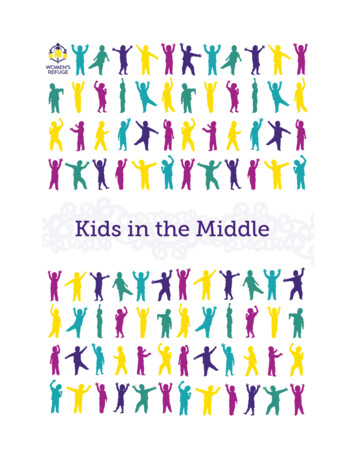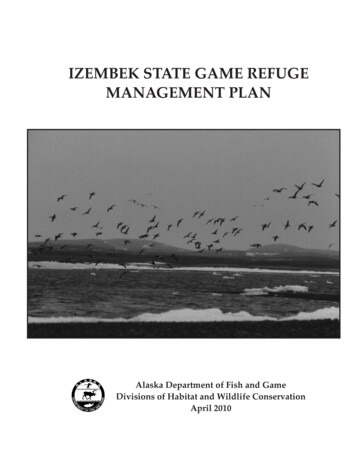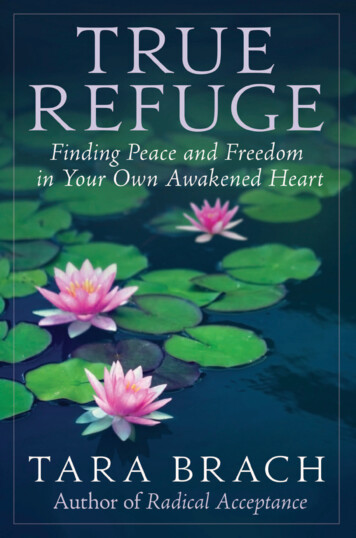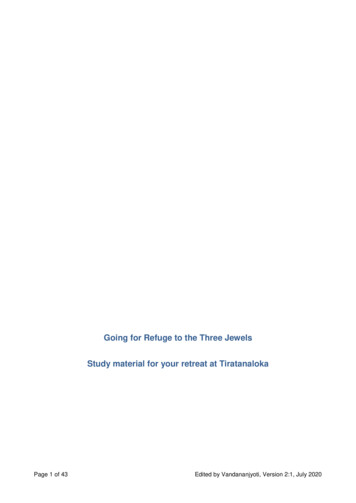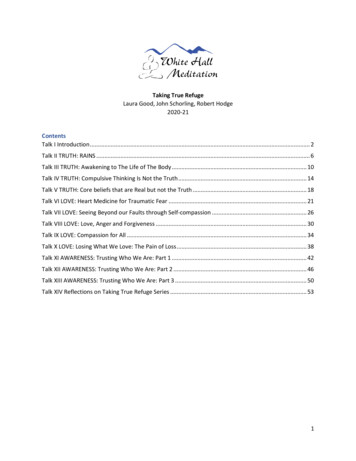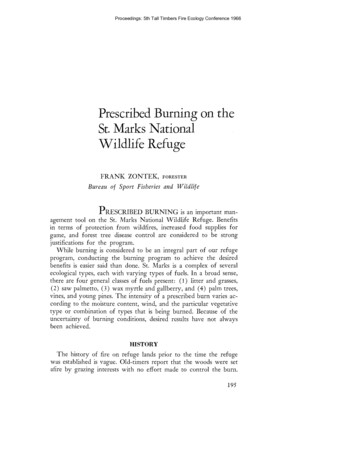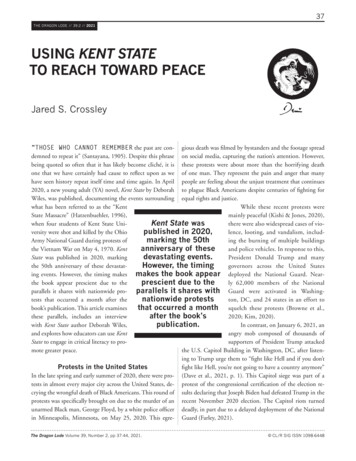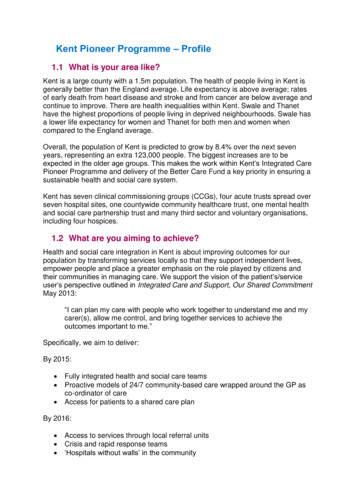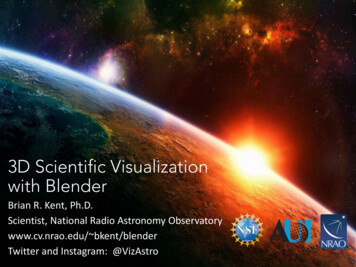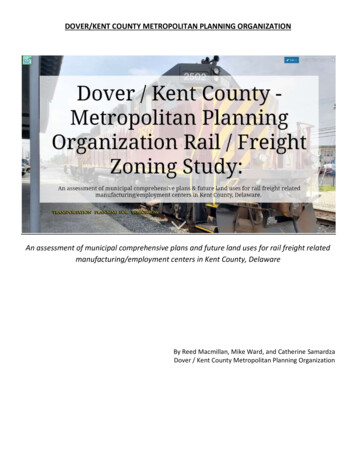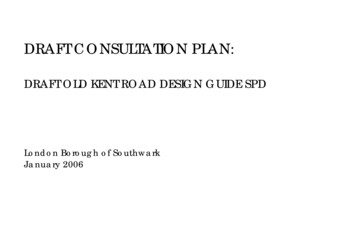
Transcription
Refuge and Resilience
The series publishes original scholarly books that advance our understanding ofinternational migration and immigrant integration. Written by academic experts andpolicy specialists, each volume addresses a clearly defined research question ortheme, employs critical analysis and develops evidence-based scholarship. The seriesincludes single- or multi-authored monographs, volumes and edited collections.The scope of the series is international migration and integration research. Topicsinclude but are not limited to thematic and current issues and debates; comparativeresearch of a regional, national or international nature; the changing character ofurban areas in which migrants or refugees settle; the reciprocal influence of migrants/refugees and host communities; issues of integration and social inequality as well aspolicy analysis in migration research.Series Editors:Peter Li and Baha-Abu-LabanFor further volumes:http://www.springer.com/series/8811
Laura Simich Lisa AndermannEditorsRefuge and ResiliencePromoting Resilience and Mental Healthamong Resettled Refugees and ForcedMigrants2123
EditorsLaura SimichCenter on Immigration and JusticeVera Institute of JusticeNew YorkNew YorkUSALisa AndermannDepartment of Psychiatry Equity, Genderand Populations DivisionUniversity of Toronto and Mount SinaiHospitalTorontoOntarioCanadaThe findings, interpretations, and conclusions expressed herein are those of the author and donot necessarily reflect the views of the Vera Institute of Justice.ISSN 2214-9805ISSN 2214-9813 (electronic)ISBN 978-94-007-7922-8ISBN 978-94-007-7923-5 (eBook)DOI 10.1007/978-94-007-7923-5Springer Dordrecht Heidelberg New York LondonLibrary of Congress Control Number: 2014930347 Springer Science Business Media B.V. 2014This work is subject to copyright. All rights are reserved by the Publisher, whether the whole or partof the material is concerned, specifically the rights of translation, reprinting, reuse of illustrations,recitation, broadcasting, reproduction on microfilms or in any other physical way, and transmission orinformation storage and retrieval, electronic adaptation, computer software, or by similar or dissimilarmethodology now known or hereafter developed. Exempted from this legal reservation are brief excerptsin connection with reviews or scholarly analysis or material supplied specifically for the purpose of beingentered and executed on a computer system, for exclusive use by the purchaser of the work. Duplicationof this publication or parts thereof is permitted only under the provisions of the Copyright Law ofthe Publisher’s location, in its current version, and permission for use must always be obtained fromSpringer. Permissions for use may be obtained through RightsLink at the Copyright Clearance Center.Violations are liable to prosecution under the respective Copyright Law.The use of general descriptive names, registered names, trademarks, service marks, etc. in this publicationdoes not imply, even in the absence of a specific statement, that such names are exempt from the relevantprotective laws and regulations and therefore free for general use.While the advice and information in this book are believed to be true and accurate at the date ofpublication, neither the authors nor the editors nor the publisher can accept any legal responsibility forany errors or omissions that may be made. The publisher makes no warranty, express or implied, withrespect to the material contained herein.Printed on acid-free paperSpringer is part of Springer Science Business Media (www.springer.com)
To my parents and grandparents, who wereonce refugees and New Canadians; To mywonderful husband and children; And to allthe refugees who have shared their stories withme.L.A.To peace and sanity.L.S.
ForewordThe refugee experience confronts us with humanity at its most challenged—forciblyuprooted and in flight from violence, caught between countries, facing an uncertainfuture—but it also provides some of the most striking examples of human resilience.This innovative and important book explores that resilience and its implications forresettlement and mental health services, policy and practice. The contributors have awealth of research, clinical and community experience and have been at the forefrontof interdisciplinary studies that advance our understanding of refugee mental healthand adaptation. They approach the person seeking refuge and resettling in a newcountry not as a clinical, social or political problem but as the active agent of theirown survival. In so doing, they encourage us to move from diagnosing and treatingtraumatic wounds and losses to fostering individual and collective adaptation andflourishing. They emphasize the importance of the larger community that receivesthose seeking asylum and call us to a more humane and effective response.Migration has been a constant in human evolution and the ability to adapt to radically new environments is intrinsic to our psychology. The migrations of prehistorybrought us into different ecological environments that gave rise to diverse cultures,with different ways of life that included changes in modes of subsistence, worldviews,systems of values and aspirations. The roots of human resilience are in self-regulatingand self-righting adaptive systems that include our capacity to acquire new strategiesfor survival and to reorganize our ways of life to fit new contexts. Resilience thenis part of ‘human nature’ built into our multiple systems of learning, grounded inneuroplasticity, psychological inventiveness, and cultural creativity, which allow usto embrace and adopt new, hybrid identities. At the same time, continuity of identity, relationships and community are central to many individuals’ strength, sense ofcoherence, and self-efficacy.Much of the scientific research on resilience has focused on individual characteristics, but resilience is not only the outcome of psychological processes but also ofsocial process that reside in relationships among people, systems and institutions atthe level of families, neighborhoods, communities, and organizations, governmentsand transnational networks. Recognizing the social dimensions of refugee resiliencemeans we must look beyond the individual to understand the larger contexts in whichthey are embedded. Resettlement policies can support the refugee’s efforts to buildvii
viiiForeworda new life or undermine them, leaving individuals or whole groups stranded withoutconnection.International conventions on refugees and asylum emerged in the wake of theSecond World War during which countless numbers of people seeking safety wereturned away by Canada and other countries that could have easily received them.Earlier generations of migrants from Europe and other war torn areas did not havethe formal category of refugee to frame their identity but faced many of the samechallenges in escaping danger, bringing their families and loved ones to safety, andbuilding a new life in a new land. The categories of asylum-seeker, refugee and immigrant imply a clear distinction between those who migrate voluntarily for economicor other personal advancement and those who are forced to by threat of politicalviolence. In fact, this distinction is often hard to make and does not fit the complexrealities of individual struggles.After achieving their escape from harm’s way, refugees seek not just bare survivalbut a better life for themselves and their families. Those who are able to focus ona hopeful future, find meaningful work and relationships, and invest in the nextgeneration, are likely to fare well. Those caught in a consuming nostalgia for whatthey have lost, may find it difficult to invest in the future or find the energy andflexibility needed to face all the many demands of their new environment.For most refugees, the long-term outcome of migration will be positive. But thisoutcome depends on many factors involving the individual’s history, the kinds ofviolence and losses they have endured, their migration trajectory, and especially,their reception in the country where they find a new home. A major lesson from theresearch on long-term adaptation collected in this volume is that the quality of the hostcountry reception of newcomers is a major determinant of their health, well-beingand social integration. This is good news because this reception is something that canbe improved through public policy. The dilemma is that in the current environmentof international insecurity, there is a risk of forgetting our recent history, renegingon our commitments, and closing the doors to those seeking asylum and making itharder for those accepted to build their new lives.Our experience with refugees and asylum seekers at the Cultural ConsultationService in Montreal underscores their resilience as well as the major challenges theyface. Many of these challenges stem not from having to navigate a new cultural environment, but from difficulties negotiating bureaucratic institutions that are divorcedfrom the human realities of forced migration. For example, we know that detentioncan be extraordinarily harmful, that long delays in deciding outcomes are corrosiveto well-being and confidence, that taking meaningful work and choice away frompeople renders them helpless, and that ensuring the safety of loved ones left behind and reuniting with one’s family are all powerful determinants of mental health.Yet politically motivated policies and institutional practices strew obstacles in therefugee’s path.The emphasis on strength and resilience is a welcome shift from the emphasis inmental health research on vulnerability and pathology. In focusing on strengths andresilience, however, there is a risk that those who have a harder time will be furtherstigmatized as ‘lacking resilience’. This is especially egregious when the barriers to
Forewordixadaptation clearly reflect social obstacles and adversity. It is important that resiliencebe understood not as the inevitable outcome of some inherent quality or capacity ofthe individual but as a dynamic process of interactions between individuals and thecircumstances in which they find themselves. What is adaptive in one situation may beproblematic in others and new strengths may emerge when the individual is affordednew opportunities. The resilience perspective is an invitation to clinicians, policymakers and others to think in terms of strengths and solutions rather than deficits andto ensure that our welcoming and hospitality to those most in need provides themwith the basic structures and resources they need to rebuild their lives and, ultimatelyto contribute to the variegated tapestry of our communities.The creation of refugee status and the moral and legal obligation to provide asylumreflect an emerging global ethic essential for our collective survival. Indeed, climatechange and the resultant economic and politic instabilities are likely to dramaticallyincrease the need for an international human rights regime in the years to come. In thewake of past failures, Canada became a model of progressive practices in the area ofrefugee resettlement. Unfortunately, recently enacted restrictive policies tighteningthe refugee determination process and reducing basic coverage of medical care forrefugees (on the absurd argument that they are better treated than the average Canadian citizen) have undermined this commitment. These short-sighted policies havebeen widely denounced by many sectors of society including physicians and thosemost knowledgeable about the refugee experience. Hopefully, these regressive stepswill soon give way to a more socially responsive view consonant with long-standingCanadian values so that we can once again contribute to advancing internationalhuman rights.In addition to advocating for change at the level of policy, and health and social services professionals and researchers can contribute in many ways to the well-being andsocial integration of refugees. In the clinical encounter, we can work to understandrefugees’ stories, learning more about their unique predicaments and developing theskills needed to respond effectively. We can support others in the community in theirefforts to provide a welcoming space and pathways toward integration and reunification for refugees and their families. As the contributors to this volume show, throughresearch, advocacy and clinical engagement, we can contribute to building a civilsociety founded on the values of dignity and diversity.Montreal, August 2013Laurence J. Kirmayer
Contents1Editor’s Introduction . . . . . . . . . . . . . . . . . . . . . . . . . . . . . . . . . . . . . . . . . . .Laura Simich2What Is Resilience and How Does It Relate to the RefugeeExperience? Historical and Theoretical Perspectives . . . . . . . . . . . . . . .Wade E. Pickren173Social Determinants of Refugee Mental Health . . . . . . . . . . . . . . . . . . . .Farah N. Mawani274The Debate About Trauma and Psychosocial Treatment for RefugeesClare Pain, Pushpa Kanagaratnam and Donald Payne515Reflections on Using a Cultural Psychiatry Approach to Assessingand Fortifying Refugee Resilience in Canada . . . . . . . . . . . . . . . . . . . . . .Lisa Andermann61Personal and Social Forms of Resilience: Research with SoutheastAsian and Sri Lankan Tamil Refugees in Canada . . . . . . . . . . . . . . . . . .Morton Beiser7367Social Support in Refugee Resettlement . . . . . . . . . . . . . . . . . . . . . . . . . .Miriam J. Stewart918Newcomer Youth Self-Esteem: A Community-Based Mixed MethodsStudy of Afghan, Columbian, Sudanese and Tamil Youth in Toronto,Canada . . . . . . . . . . . . . . . . . . . . . . . . . . . . . . . . . . . . . . . . . . . . . . . . . . . . . . . 109Nazilla Khanlou, Yogendra B. Shakya, Farah Islam and Emma Oudeh9Newcomer Refugee Youth as ‘Resettlement Champions’ for theirFamilies: Vulnerability, Resilience and Empowerment . . . . . . . . . . . . . . 131Yogendra B. Shakya, Sepali Guruge, Michaela Hynie, Sheila Htoo,Arzo Akbari, Barinder (Binny) Jandu, Rabea Murtaza, Megan Spasevski,Nahom Berhane and Jessica Forsterxi
xii10 A Social Entrepreneurship Framework for Mental Health Equity:The Program Model of the Canadian Centre for Victims of TortureSean A. Kidd, Kwame J. McKenzie and Mulugeta AbaiContents15511 The Role of Settlement Agencies in Promoting Refugee Resilience . . . 167Biljana Vasilevska12 Mental Healthcare Policy for Refugees in Canada . . . . . . . . . . . . . . . . . . 181Kwame J. McKenzie, Andrew Tuck and Branka Agic13 Supporting Human Trafficking Survivor Resiliency throughComprehensive Case Management . . . . . . . . . . . . . . . . . . . . . . . . . . . . . . . 195Lauren Pesso14 Migrant Mental Health, Law, and Detention:Impacts and Alternatives . . . . . . . . . . . . . . . . . . . . . . . . . . . . . . . . . . . . . . . . 211Chelsea Davis
ContributorsMulugeta Abai Canadian Centre for Victims of Torture, Toronto, CanadaBranka Agic Health Equity Unit, Centre for Addiction and Mental Health, Toronto,CanadaArzo Akbari Access Alliance Multicultural Health and Community Services,Toronto, CanadaLisa Andermann Equity, Gender and Populations Division, Department ofPsychiatry, University of Toronto and Mount Sinai Hospital, Toronto, Ontario,CanadaMorton Beiser Ryerson University, Toronto, CanadaKeenan Research Centre and Li Ka Shing Knowledge Institute, St. Michael’sHospital, Toronton, CanadaCultural Pluralism and Health, University of Toronto, Toronto, CanadaNahom Berhane Access Alliance Multicultural Health and Community Services,Toronto, CanadaChelsea Davis Mailman School of Public Health (MPH), Columbia University,New York, USAJessica Forster Access Alliance Multicultural Health and Community Services,Toronto, CanadaSepali Guruge Access Alliance Multicultural Health and Community Services,Toronto, CanadaSheila Htoo Access Alliance Multicultural Health and Community Services,Toronto, CanadaMichaela Hynie Access Alliance Multicultural Health and Community Services,Toronto, CanadaFarah Islam Access Alliance Multicultural Health and Community Services,Toronto, Canadaxiii
xivContributorsBarinder (Binny) Jandu Access Alliance Multicultural Health and CommunityServices, Toronto, CanadaPushpa Kanagaratnam Department of Psychiatry, Faculty of Medicine, University of Toronto, ON, CanadaCentre for Addiction & Mental Health, Toronto, ON, CanadaNazilla Khanlou Echo Chair, Women’s Mental Health Research, Faculty ofHealth, Lillian Wright Maternal Child Health Scholars Program, School of Nursing,York University, Toronto, ON, CanadaSean A. Kidd Department of Psychiatry and Centre for Addiction and MentalHealth, University of Toronto, Toronto, CanadaFarah N. Mawani Dalla Lana School of Public Health, University of Toronto,Toronto, CanadaKwame J. McKenzie Department of Psychiatry and Centre for Addiction andMental Health, University of Toronto, Toronto, CanadaRabea Murtaza Access Alliance Multicultural Health and Community Services,Toronto, CanadaEmma Oudeh Access Alliance Multicultural Health and Community Services,Toronto, CanadaClare Pain Department of Psychiatry, University of Toronto, and Mount SinaiHospital, Toronto, ON, CanadaDonald Payne Health Network, Amnesty International (English Speaking) Canada,Toronto, CanadaLauren Pesso My Sisters’ Place, New York, USAWade E. Pickren Center for Faculty Excellence, Ithaca College, Ithaca, NY, USAYogendra B. Shakya Access Alliance Multicultural Health and CommunityServices, Toronto, CanadaLaura Simich Vera Institute of Justice, New York, NY, USAMegan Spasevski Access Alliance Multicultural Health and Community Services,Toronto, CanadaMiriam J. Stewart Faculty of Nursing, University of Alberta, Edmonton, CanadaAndrew Tuck Department of Psychiatry and Centre for Addiction and MentalHealth, University of Toronto, Toronto, CanadaBiljana Vasilevska Department of Health, Aging and Society, McMaster University, Hamilton, Canada
About the AuthorsMulugeta Abai is Executive Director of the Canadian Centre for Victims of Torture(CCVT). He has over 20 years of community involvement in the areas of communitydevelopment, advocacy and anti-racism, and has written numerous articles and guidesfor community members that work with refugees who are survivors of torture andwar.Lisa Andermann M.Phil., M.D., FRCPC is an Assistant Professor in the Department of Psychiatry at the University of Toronto and psychiatrist at Mount SinaiHospital, where she works in the Psychological Trauma Clinic and the EthnoculturalAssertive Community Treatment Team. Dr. Andermann is a consultant psychiatristand former Board Member for the Canadian Centre for Victims of Torture, and continues to be active on their Health Committee. Her main areas of interest in researchand teaching focus on cultural psychiatry. For the past few years, she has been veryinvolved in an educational initiative to enhance the cultural competence of the postgraduate psychiatry residency curriculum and has led a faculty development initiativeon culturally competent supervision and teaching which won the 2008 Ivan L. SilverAward for Excellence in Continuing Mental Health Education. She has been part ofthe Toronto-Addis Ababa Psychiatry Program since its inception in 2003, assistingin the development of the first psychiatry residency training program in Ethiopia.She has an undergraduate degree in Anthropology from McGill University, whereshe completed her medical studies, and a graduate degree in Social Anthropologyfrom Cambridge University.Dr. Morton Beiser CM, MD, FRCP is Professor of Distinction and ProgramDirector Culture, Immigration and Mental Health, Dept of Psychology, RyersonUniversity; Crombie Professor Emeritus of Cultural Pluralism and Health, University of Toronto; and Founding Director and Senior Scientist, Ontario MetropolisCentre of Excellence for Research on Immigration and Settlement (CERIS). He hasbeen Principal Investigator for studies including the Refugee Resettlement Project,a ten year study of refugees from Southeast Asia; Flower of Two Soils, a study ofmental health and academic achievement among American Indian and First Nationsreserves; Immigrants and Tuberculosis; Community in Distress, an investigation ofthe mental health of Sri Lankan Tamils in Toronto; The New Canadian Children andxv
xviAbout the AuthorsYouth Study, a national, longitudinal investigation of the health and development ofapproximately 4,000 immigrant and refugee children in six Canadian cities; Leaversand Stayers, a comparison between Ethiopian children growing up in Toronto and inAddis Ababa; and Promised Land, Land of Promise, a study of Ethiopian youth in Israel and Canada. Dr. Beiser has authored more than 180 scientific papers, and a bookentitled Strangers at the Gate, (University of Toronto Press 1999). Recognitions include National Health Scholar and Scientist Awards from Canada’s National HealthResearch and Development Program; the University of Toronto Beverley Distinguished Professor Award; the Rockefeller Foundation Resident Scholar Award; theCanadian Psychiatric Association’s Alexander Leighton Award for Research in Psychiatric Epidemiology, and the Order of Canada, the country’s highest distinctionfor lifetime achievement.Chelsea Davis is the Coordinator of the Mass Incarceration and Public Health Initiative at Columbia University, Mailman School of Public Health. She received herMPH in History and Ethics of Public Health and Medicine from Columbia UniversityMSPH after getting her BA from Vanderbilt University. Her areas of expertise areresearch and policy at the intersection of public health and criminal justice.Dr. Sepali Guruge is an Associate Professor in the Daphne Cockwell School ofNursing at Ryerson University.Michaela Hynie is a social and cultural psychologist in the Department of Psychology, York University, and the Associate Director of the York Institute for HealthResearch.Farah Islam is a Ph.D. candidate in the Kinesiology and Health Science Programat York University. Her dissertation focuses on mental health and mental healthcareutilization patterns of Canada’s immigrant and ethnocultural populations.Pushpa Kanagaratnam Ph.D. is a clinical psychologist and Assistant Professorat the Department of Psychiatry, University of Toronto and has affiliate status as aResearch Scientist at the Center for Addiction and Mental Health. As an immigrantherself, her personal experience enlightens her clinical practice and writing.Nazilla Khanlou, RN, Ph.D. ECHO’s inaugural Chair in Women’s Mental HealthResearch in the Faculty of Health at York University and an Associate Professor in itsSchool of Nursing, conducts interdisciplinary research in community-based mentalhealth promotion with youth and women.Sean Kidd, Ph.D. is an internationally recognized authority in the area of youthhomelessness research and has extensively examined stigma and marginality amongpersons with severe mental illness. Dr. Kidd is an Assistant Professor with the Department of Psychiatry, University of Toronto, and is head of Psychological Servicesfor the Centre for Addiction and Mental Health (CAMH) Schizophrenia Division.Farah N. Mawani is Visiting Scholar, Massey College, University of Toronto. Shehas global research, policy, teaching, and writing experience in social determinants of
About the Authorsxviimental health inequalities. She focuses on the negative impact of workplace environments, human rights abuses, and on mental health inequalities. She also focuses onthe transformative capacity of peer support to reduce mental health inequalities. Shehas national experience as Senior Policy and Research Analyst, Mental Health Strategy, Mental Health Commission of Canada, and as a Multicultural Mental HealthResource Centre Steering Committee member. She is a founding member of theCentre for Social Innovation—Regent Park, Toronto.Kwame McKenzie, M.D., FRCPC Senior Scientist and Medical Director, Centrefor Addiction and Mental Health and Professor, Department of Psychiatry, University of Toronto. Psychiatrist, academic, social commentator and advocate—Dr.McKenzie is committed to using scientific investigation to help to build inclusive,humane and effective models of mental health care for everyone. He is a soughtafter speaker in academic and community circles, including invited media appearances. Dr. McKenzie’s research focuses on the science of improving mental healthservices. Key areas of interest include social determinants of health, society andmental health, social capital and mental health, redesigning mental health servicesfor visible minority groups, efficacy of treatment in schizophrenia, psychiatric diagnosis, community engagement, racism, pathways to care, and suicide. BrankaAgic is Manager, Clinical Health Equity, CAMH, and Andrew Tuck is ResearchCoordinator, Clinical Health Equity, CAMH.Emma Oudeh, RN earned her BA at Carleton University and BScN at York University. She is completing her MScN and primary health care nurse practitionercertificate at York University.Clare Pain M.D., FRCPC is Associate Professor at the Department of Psychiatry,University of Toronto. As a psychiatrist, she works as Director of the PsychologicalTrauma Program at Mount Sinai Hospital, Toronto, and in association with theCanadian Centre for Victims of Torture.Donald Payne is a psychiatrist who has 34 years of experience in working withrefugees through CCVT. He has provided expert testimony at refugee hearings, inthe Ontario Superior Court and in the Federal Court of Canada.Lauren Pesso, LMSW MPA is the Director of the Human Trafficking Program atMy Sisters’ Place (MSP) in Westchester County, New York. Prior to joining MSP,Lauren worked as a counselor for victims and witnesses of crime at Sanctuary forFamilies and the Crime Victims Treatment Center at St. Luke’s-Roosevelt Hospital;managed gender-based violence research teams in Eastern Europe and East Africa;and coordinated various maternal and reproductive healthcare programs at EngenderHealth, an international women’s health organization.Dr. Wade Pickren is the director of the Center for Faculty Excellence at IthacaCollege. He is also the President of the Society for General Psychology and PastPresident of the Society for the History of Psychology. Wade’s current scholarlyinterest is the transformation of knowledge and practice across time and place.
xviiiAbout the AuthorsYogendra B. Shakya, Ph.D. is the Senior Research Scientist at Access AllianceMulticultural Health and Community Services. Sheila Htoo and Arzo Akbariworked as Lead Peer Researchers at Access Alliance for the Refugee Youth Healthstudy. Barinder (Binny) Jandu, a recent MPH graduate in Health Promotion andCommunity Development, has worked on many health promotion initiatives andassisted with data analysis for the study. Rabea Murtaza worked as Research Coordinator for the Refugee Youth Health study at Access Alliance and currently is acommunity facilitator and teaches in the departments of Social Service Work andCommunity Work at Sheridan College. Megan Spasevski is a Research Coordinatorat Access Alliance. Nahom Berhane is the Hub Community Development Coordinator at Access Alliance and has been working with vulnerable populations for thepast 10 years. Jessica Forster, Youth Worker at Access Alliance, holds an LLM inInternational Law with International Relations and has worked with communitieswith refugee experience for the past five years.Laura Simich, Ph.D. joined the Center on Immigration and Justice, Vera Institute ofJustice, New York, as Research Director in 2011. For the previous ten years, she wasa Research Scientist at Canada’s largest research and teaching hospital, the Centrefor Addiction and Mental Health in Toronto, where she conducted mixed-methodsresearch with immigrant and refugee communities. She has held appointments asAssociate Professor, Department of Psychiatry, and Assistant Professor, Department of Anthropology, at the University of Toronto. From 2000 to 2010, Lauraconducted studies on immigration and social determinants of mental health, specializing in community-based, policy-oriented research. Her prior research focused onsocial support, refugee resettlement, resilience and immigrant child wellbeing. Sheis currently the Principal Investigator on a study funded by the National Instituteof Justice, U.S. Department of Justice, Improving Trafficking Victim Identification:Evaluation and Dissemination of a Screening Tool. She received her doctorate incultural anthropology from Columbia University.Miriam Stewart, PhD, FRSC, FCAHS conducts research on social determinantsof health of vulnerable populations and salient interventions. Dr. Stewart has receivedthree career awards in Canada and has served as Director, Atlantic Health Promotion Research Centre, Co-PI of Maritime Centre of Excellence on Women’s Health,Director and Chair of Center for Health Promotion Studies (University of Alberta)and Scientific Director of the Canadian Institutes for Health Research Institute ofGender and Health. She has received the University of Alberta Kaplan Award forExcellence in Research.Biljana Vasilevska, M.Ed. is a researcher in Hamilton, Canada, where she workson various projects related to health and vulnerable members of society. She was theResearch Coordinator of the Refugee Resiliency study and the multi-site RefugeeMental Health Practices, both of which were conducted at the Centre for Addictionand Mental Health in Toronto.
Chapter 1Editor’s IntroductionLaura Simich“God, I thought, did I really have to choose between peaceand sanity”. (“K’naan: An immigrant song,” The Globeand Mail, May 10, 2010.)Abstract Every year, a relatively small number of refugees are given opportunitiesthrough official channels to resettle in host countries that have agreed to providea safe haven under international law. Though challenging to survive und
Refuge and Resilience. The series publishes original scholarly books that advance our understanding of international migration and immigrant integration. Written by academic experts and . While the advice and information in this book are believed to be true and accurate at the date of publication, neither the authors nor the editors nor the .
